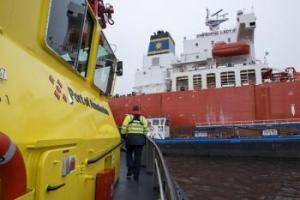Harbour Master
Harbour Masters
Worldwide there are approximately 3,000 merchant ports and the work of the Harbour Master can vary widely from country to country and from port to port even within the same country.


Strengthening port security in Madagascar was the focus of a training workshop held in Antananarivo, Madagascar from 6 to 10 March.
This event brought together 24 participants, including Port Facility Security Officers (PFSOs) from various ports in Madagascar as well as representatives of the Designated Authority (Agence Portuaire Maritime Fluviale (APMF)).
Port Facility Security Plans
Participants improved their knowledge and skills in developing and implementing port facility security plans (PFSPs) in order to perform their duties in accordance with the provisions of relevant IMO regulations: SOLAS Chapter XI-2 and the International Ship and Port Facility Security Code (ISPS Code). This training will also provide a solid foundation on oversight roles and responsibilities of designated authorities.
It was reported by IMO that the workshop was the latest in a series of activities under the European Union-funded project on Port Security and Safety of Navigation in Eastern and Southern Africa and the Indian Ocean, which involves nine beneficiary countries, including Madagascar.
Note: 2050 Africa’s Integrated Maritime Strategy
Under the project, IMO aims to assist participating countries to enhance maritime security and safety within the region in line with the 2050 Africa’s Integrated Maritime Strategy. For more see the nearby pdf and here:
https://www.unep.org/resources/report/africas-integrated-maritime-strategy-2050
On 6 March the opening ceremony was attended by representatives of the EU delegation and of the UN Office on Drugs and Crime (UNODC) as well as the General Director of the Malagasy Maritime Administration.
Illustration per: www.imo.org
IMO ©.
Founded in 2017, MarineLabs delivers high-resolution, real-time, and historical wind, wave, and weather data, as well as hyper-local 10-day forecasting, from a growing network of cloud-connected, rugged sensor nodes.
The International Harbour Masters Association (IHMA) and the Port of Rotterdam Authority are pleased to announce the 15th International Harbour Masters Association Congress, to be held from 09–12 June 2026 at Theater Zuidplein in Rotterdam.